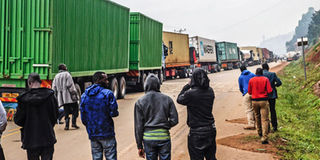Rwanda blockade costs Uganda Shs530 billion

Closed. Cargo trucks parked at Katuna border post. Uganda’s exports to Rwanda have been falling on the back of a border dispute that saw Kigali close the Katuna and limiting entry of Uganda traders through other border points. PHOTO BY ROBERT MUHEREZA
What you need to know:
- President Paul Kagame this week called off the East African Community (EAC) Heads of State Summit slated for November 30.
- Stuart Jason Mwesigwa, a director at the East African Business Council, said whereas some milestones have been registered since its revival in 1999, member states should reflect on how far they have walked the journey of integration.
The closure of the Katuna-Gatuna border has cost Uganda Shs530 billion since March this year, the Private Sector Foundation of Uganda (PSFU) has said.
While announcing the upcoming high level business and investment summit to celebrate 20 years of the East African Community (EAC) integration on Tuesday, Mr Gideon Badagawa, the executive director of PSFU said the closure of the Katuna-Gatuna border to deny Ugandan goods from accessing the Rwanda market, is symptomatic of the protectionist tendencies hindering the full integration of the EAC because states still view themselves as sovereign states.
“Uganda has been losing $16 million (Shs58.9b) every month since Rwanda closed the border, affecting our food and beverages, steel, roofing materials, cement and sugar,” Mr Badagawa said adding that the developments at the Rwanda border were worsened by the Ebola outbreak in Democratic Republic of Congo and the war in South Sudan, which has stalled the operational capacity of factories in the country.
He said with intra-regional trade currently standing at 12 per cent, the EAC should stop thinking of accessing other regional markets if member states cannot trade among themselves. Currently, it is still very difficult for capital, goods and services to move freely within the region.
Stuart Jason Mwesigwa, a director at the East African Business Council, said whereas some milestones have been registered since its revival in 1999, member states should reflect on how far they have walked the journey of integration. While the establishment of the Single Customs territory and one-stop border posts has eased movement of goods across borders, several challenges still need to be addressed.
“We still have non-tariff barriers, protectionist tendencies by nations, delay in harmonisation of EAC agreed decisions and directives. The question remains, has the private sector remained in the driving seat during the last 20 years of integration?” he said.
EAC summit called off
President Paul Kagame this week called off the East African Community (EAC) Heads of State Summit slated for November 30.
Rwanda closed its border with Uganda in February shortly after President Kagame assumed office as the EAC chair. The relations between the two countries have remained icy since.




